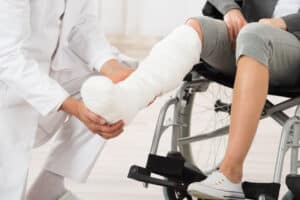Many people experience lingering problems after workers compensation back injuries, even when they get good medical treatment. In a workers compensation case, your treating doctor will likely consider your work status and restrictions at each medical appointment.
Ongoing pain and other symptoms from back injuries can make it very difficult for you to return to work. Some of the most common symptoms I see people have after a serious back injury are ongoing pain and numbness in the back and legs.
These lingering symptoms often make it difficult for someone to do the following types of activities:
- Standing or walking for a long time
- Sitting for a long time
- Lifting heavy items
- Bending over
- Climbing
- Twisting
Many people have to do some or all of these activities at their regular jobs. If your doctor has discussed returning to work after a back injury, you need to make sure you understand the common problems that could come up when you try to return to work.
 Returning to a “made up” job
Returning to a “made up” job
If you can go back and perform your regular job, you may not have any problems. But, when you cannot perform your regular job, your employer may make up a job to try to bring you back to work.
One issue with a “made up” job is that it will likely be temporary. If your company comes up with a new job just to accommodate your restrictions, there is a good chance they do not really need that job long term.
If they are only providing this job so that they do not have to pay you workers compensation weekly benefits, you might not have a long term future with the company. If they can get the doctor to say you are better, you could find yourself without a job. Unfortunately, this happens a fair amount in Georgia workers compensation cases since Georgia is an “at will employment” state.
The job is different than what your employer claims it will be
I have seen this come up many times. Your employer tells you that they have an easy job for you. They often tell your doctor the same thing.
When you go in to try the job, you then find out that it is not as easy as your employer claimed. They may require you to lift heavy items. You may not be able to sit down when you need to.
If this happens, you will probably have some questions:
- What happens if you violate the work restrictions your doctor gave you?
- What happens if you refuse to do what your employer asks?
- Will the insurance company have to restart your workers compensation benefits if you refuse the job?
The answer to a lot of these questions is, “It depends”. The specific facts of your case will matter a lot in determining what will happen if you violate your work restrictions or refuse to work.
How long it has been since you have returned to work can have a big impact on whether the insurance company will have to restart your workers compensation benefits. This is because Georgia has very specialized rules that apply when you return to a light duty job.
Job duties that may be particularly difficult for you
If you continue to have back pain or leg pain or both, just about any activity can be difficult. It becomes even more difficult when you have to perform that activity 8 hours or more a day, 5 days or more a week.
Your work station at your company may not provide you a lot of flexibility. Your job may require that you stand almost all the time. But, many people with back injuries find it difficult to stand for very long at all and frequently need to change positions to sitting or laying down.
Lifting and carrying can cause a lot of problems as well. If you have to bend or stoop to lift, working with a back injury can be even more difficult.
The possibility of your employer firing you
Many people worry about getting fired by their employer some time after they return to work. In Georgia, most employer-employee relationships are “at will”. This basically means your employer can fire you for a good reason, bad reason, or no reason at all.
If you have concerns about your employer firing you when you return to work after a back injury, you should read this short article about whether your employer can fire you while you are on light duty. Having this information before returning to work is very important.
Entitlement to temporary partial disability benefits
Your back injury may limit you to light duty work. Light duty jobs do not necessarily pay as much per week as you made before your injury.
If your employer puts you in a different job, that job may have a lower hourly pay rate. Also, your doctor may limit the number of hours you can work. You also may have to miss time from work to go to medical appointments for your injury.
If your back injury causes you to make less money when you return to work, the insurance company should pay you temporary partial disability benefits. Unfortunately, insurance companies almost never do this correctly.

Do you have to volunteer to return to work if your doctor release you?
Nothing requires you to go back to work. But, the insurance company may be able to stop your benefits if you do not. That all depends on a few things:
- Whether you are getting temporary total disability benefits;
- Whether your employer has offered you a suitable job within your work restrictions; and
- Whether the insurance company has gotten the doctor to approve the job they have offered you.
The answers to each of these questions greatly affects whether the insurance company can stop your benefits if you do not go back to work. If your benefits do get stopped, it can take a long time to get them restarted and you could have to go to court to do so.
I would recommend talking to an attorney if your workers compensation doctor has released you to return to work in any capacity after a back injury. This way, you do not take the chance of making the wrong decision and hurting your case.
 Returning to a “made up” job
Returning to a “made up” job









